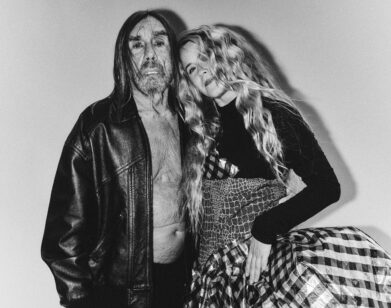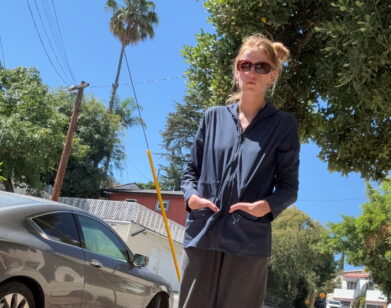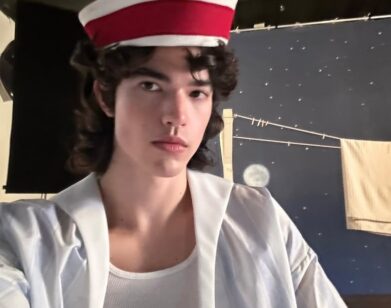Exclusive Video Premiere and Interview: ‘Plant Lilies at My Head,’ Tropic of Cancer

Since 2007, Los Angeles’ Camella Lobo has set about trying to pin down the dreary patterns of life. First with her husband Juan Mendez, who’s known in experimentally minded circles for his work as Silent Servant, and then on her own, Lobo’s Tropic of Cancer project has explored that bleakness in a series of short-form releases in shades of gray (even the covers of those records bear testament to that). But even in those melancholic and achromatic explorations, there’s always been a hint of placidity, of finding contentment and calm within life’s storms. It’s that side of her work that Lobo is engaging wholeheartedly on her debut LP for Blackest Ever Black, Restless Idylls. The record still sticks to the shadows, for the most part, but when Lobo’s lyrics break through the wavering tides of reverb and her synth lines shimmer rather than warble, Tropic of Cancer feels downright hopeful.
On the phone from her Los Angeles home, Lobo speaks eagerly about the new record and the circumstances that spawned it—including her husband’s departure from the project. Check out the conversation below, as well as our premiere of the strikingly vibrant video for “Plant Lillies at My Head,” one of the Restless Idylls‘ obvious standouts, directed by Pedro Maia.
COLIN JOYCE: Let’s start at the beginning. When did you start making music under the name Tropic of Cancer?
CAMELLA LOBO: It was an accident at first. My husband and I met a long time ago at a punk show, and shortly after we became involved we started making music together.
I had just dabbled with music. I took vocal lessons here and there, knowing that I was always going to do something, but not really knowing what. I just grew up with music and singing in church choirs, but I hadn’t really found the right people to work with. I had been off and on picking up music with friends at people’s houses. Shortly after we met, we were living together and making music together and within a couple weeks of starting on our first material someone asked us to play a show. We didn’t even have a name or anything. That’s how it all began. We kept playing shows here and there. It was super DIY for a long time, though it still is.
We’ve been working together since 2007 and we put out our first record in 2008. From there it grew into what it is today. We put out a bunch of releases between then and 2011, and then we got this opportunity to do some shows with HTRK and they invited us to play some dates in Europe with them. At that time, Juan’s music and work was getting crazy, and I was wanting to take Tropic of Cancer a little more seriously, and our visions weren’t really aligning in that sense. It’s hard for us to work together in general, so he decided to leave the band and I decided to pursue it as a solo project. That’s where we are today.
JOYCE: What makes it difficult for the two of you to work together?
LOBO: Music is a really personal thing. It’s really hard to find music that you 100 percent align with. It’s very few and far between. When music is such a personal thing, something as simple as a tone going up or a tone going down can be a really big issue. I watched this interview a really long time ago with Jay Reatard before he passed away, and he was talking about how when he would play music and something would stop in the middle of the progression of things, he would become completely infuriated. It was this very physical, crazy reaction. I’ve always felt connected to that idea, because that’s similar to the things that were happening with Juan and I. For a long time, we got along with how we wanted the music to sound. It was easy for me to go into the fold and make music with him, but when I started to have a broader vision of what I wanted from music it started to become an issue. All of a sudden it was like I knew too much. It got dark and crappy. I take full blame. [laughs]
JOYCE: What was that moment of realization when you realized what you wanted your project to be?
LOBO: I don’t know if it was a big, grand “Aha!” moment. There was more pressure. That was the bigger thing. There are these crazy fucking deadlines, and people are asking for shit. It wasn’t what Juan wanted, but it was what I wanted. I kept pushing it forward, and he really wanted to work on his own stuff. When that came into play, Tropic of Cancer, wasn’t a positive working environment for both of us. When we worked on The Sorrow of Two Blooms, it all started coming together, and I got an idea of where I wanted it to go.
JOYCE: How long have these songs that make up the new record been in the works?
LOBO: “Court of Devotion” dates back to just about two days after Juan left the band, so two years ago. I’ve been collecting these songs without the intention of putting out an LP. I knew I had to keep making material. I was working a lot on releases and getting it all out of my system and trying to figure out if I could get this done and be inspired on my own. I had all of these songs and then when I had the conversation with Blackest Ever Black about writing an LP, I was thinking, “I don’t know…” I thought I needed a break to recalibrate. But it was the push that I needed to push myself. I started thinking about a cohesive idea and bought some more instruments. At some point I just decided, fuck it, I’m going to do it.
JOYCE: One of my big impressions of the album is how dramatic it is. I know it’s a cliché to talk about abstract music in terms of the “cinematic,” but is film something you’re inspired by?
LOBO: It’s funny that you say it feels cinematic. The whole idea behind the record was that I wanted it to be this collection of scenes from a life, my life, and things that happen to people in life over and over again. I have this crazy obsession with watching people fall in love and out of love and living and dying, just how we keep going through this mortal course. We know exactly what’s going to happen. I wanted the record to feel like a collection of scenes or stories. That’s where the idea of bringing in the word “idylls” comes in. Idylls are short poems that are known as snapshots. If someone says it’s an idyllic time, it’s these beautiful pastoral scenes. They’re poems about love, but snapshots of a moment. I was trying to come to terms with these scenes in life and these things that we see as natural parts of human existence. Each song tries to describe these scenes, so it is soundtrack-y or cinematic in that sense.
JOYCE: So you said before that you now have an idea where you wanted this project to go, what’s next?
LOBO: I just want to get to the point where I’ve come out of this huge race where I’ve had to prove myself. I had to prove to myself I can do this by myself—without Juan. We’re still in a relationship, and he’s still really supportive of Tropic of Cancer. But I had to go through holding up the music and carrying on the tradition and legacy of what we started on our own. There was a lot of fear for me when Juan left. I didn’t know whether I’d be able to do it on my own. I didn’t tell people for a really long time. I went on tour, and some people were really pissed off that he wasn’t there. I was afraid people wouldn’t see the music as valuable without Juan involved. I want to being inspired by the world around me. I want to keep the music experimental and stay away from the trap that a lot of musicians fall into when they rely financially on their music. I’m fortunate in the sense that I have a pretty average job and I do okay financially. I can let the music pay for itself and not have to worry about it paying for me. I don’t really know what the next thing is for Tropic of Cancer. The future is unwritten at this point.
RESTLESS IDYLLS IS OUT NOW ON BLACKEST EVER BLACK. FOR MORE ON TROPIC OF CANCER, PLEASE VISIT THE ARTIST’S FACEBOOK PAGE.






